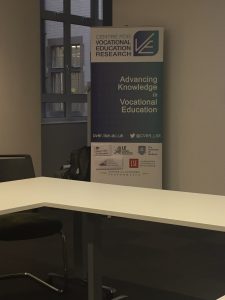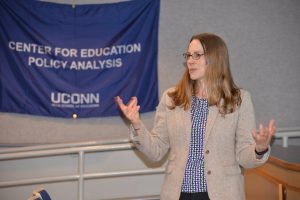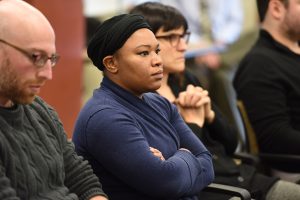Chalkbeat (CEPA’s Preston Green quoted on Charter Schools)
Did new evaluations and weaker tenure make fewer people want to become teachers? A new study says yes
Chalkbeat (Study co-authored by EDLR’s Shaun Dougherty featured)
Video of CEPA Panel on the Future of K12 Policy in Connecticut
Global Researcher: Professor Shaun Dougherty Presents Vocational Education Research Abroad
Connecticut Supreme Court to Hear Landmark School Funding Case
WNPR (LLEP doctoral student, Robert Cotto previews the upcoming Supreme Court case on school funding)
CT Has One of the Nation’s Best Student-Teacher Ratios
CT Mirror (EDLR’s Morgaen Donaldson comments on state’s teacher-to-pupil radio)
Looking Back at CEPA’s Success with 2016-2017 Speaker Series
Breaking down race, age and gender biases in the collegiate classroom
The Daily Campus (As part of Neag School’s CEPA Speaker Series, Dr. Ana M. Martínez Alemán from Boston College spoke about biases in the classroom)
CEPA Speaker Series
Upcoming Speakers
Amy Schwartz, Syracuse, The Maxwell School
October 25, 2016
2:30-4pm
Gentry 144
John Papay, Brown University, Assistant Professor of Education and Economics
November 9, 2016
11:30-1pm
Gentry 142/144
Title: The Effects of School Turnaround Strategies in Massachusetts
Bio: John Papay is an Assistant Professor of Education and Economics at Brown University. His research focuses on teacher policy, the economics of education, and teacher labor markets. He has published on teacher value-added models, teacher evaluation, high-stakes testing, teacher compensation, and program evaluation methodology. He has served as a Research Affiliate with the Project on the Next Generation of Teachers and a Doctoral Fellow at the Center for Education Policy Research at Harvard. A former high school history teacher, he earned his doctorate in Quantitative Policy Analysis from the Harvard Graduate School of Education.
Sean Corcoran, New York University, Associate Professor of Educational Economics
December 7, 2016
11:30-1pm
Gentry 142/144
Sean P. Corcoran is Associate Professor of Educational Economics at NYU Steinhardt, affiliated faculty of the Robert F. Wagner Graduate School of Public Service, and associate director of NYU’s Institute for Education and Social Policy (IESP). Dr. Corcoran earned his Ph.D. in economics from the University of Maryland, College Park, in 2003. Previously, he was an Assistant Professor of Economics at California State University, Sacramento (2003-2005) and a visiting scholar at the Russell Sage Foundation (2005-2006). In 2012-13 he was a visitor at the Center for Education Policy Analysis (CEPA) at Stanford University.
Dr. Corcoran’s research interests are in the Economics of Education, State and Local Public Finance, and Applied Microeconomics. His published papers have examined long-run trends in teacher quality, the impact of income inequality and school finance reform on the level and equity of education funding in the United States, the properties of “value-added” measures of teacher effectiveness, and the high school choices of middle school students in New York City. Together with colleagues at NYU, Columbia, and Seton Hall University, he is conducting one of the largest randomized control trials of information supports for school choice ever conducted.
Dr. Corcoran serves on the editorial boards of the journals Education Finance and Policy and Educational Evaluation and Policy Analysis, and is a former member of the board of directors of the Association for Education Finance and Policy (AEFP) and the research committee for the Council for the Accreditation of Educator Preparation (CAEP).
Past Speakers
Dr. Peter Young, Associate Professor University of Virginia, Curry School of Education
The Role of Social Context in Novice Teacher Development
September 27th, 2016
Speaker video (youtube link)
PowerPoint Slides (PDF)
Call for Papers: EAQ Special Issue on ESSA
